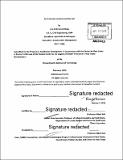Rent-to-own contracts and tax risk
Author(s)
Jimenez Mejia, Lina M
DownloadFull printable version (18.78Mb)
Alternative title
N lease for housing rental : transferring the property taxes to renters.
Other Contributors
Massachusetts Institute of Technology. Center for Real Estate. Program in Real Estate Development.
Advisor
Albert Saiz.
Terms of use
Metadata
Show full item recordAbstract
Ownership rates have been decreasing since 2004, and the rental market is becoming less affordable each day. A rent-to-own agreement would reduce barriers to purchase a property for future buyers. However, to promote this type of contract it is necessary to demonstrate that investors will be exposed to lower risk, or higher returns, than in a traditional lease. Since taxes are an important part of a real estate investment, this thesis analyzed if this risk can be mitigated by passing the taxes to the tenants. While rents and prices respond to market conditions, property taxes do not show a clear trend of how they change, leaving investors exposed to a high risk. In addition, property taxes significantly differ among states since they vary with the financial needs of each local government. Moreover, the effective tax rate can also differ from town to town, and even within the city because of the different tax districts in which the property is located and the No Ad Valorem taxes. The evolution of taxes, prices and rent in Massachusetts, and within the cities of Arlington, Newton and Wellesley is explored in this thesis to understand how property taxes evolve over the years and see if changes in rent and/or prices upset variations in taxes. In addition, this thesis also considers the evolution of these variables in Larimer County, Colorado, and in Oak Park, Illinois. Moreover, this thesis analyzed the potential return of a residential property in each of the cities studied to establish if there is any financial advantage for signing in a RTO agreement instead of a traditional lease, and if capping the taxes would reduce the financial risk. The data shows that in cities that saw a high appreciation or rental growth singing a rent-to-own contract was not the best alternative for investors since their return would have been lower. In addition, passing the taxes is not attractive enough to investors since the additional points that this procedure offers are not significant, and in some case, when taxes decrease, they actually decrease the investor's return.
Description
Thesis: S.M. in Real Estate Development, Massachusetts Institute of Technology, Program in Real Estate Development in conjunction with the Center for Real Estate, 2016. Title as it appears in the Degrees awarded booklet, Feb. 17, 2016: A N lease for housing rental: transferring the property taxes to renters. Cataloged from PDF version of thesis. Includes bibliographical references (pages 140-141).
Date issued
2016Department
Massachusetts Institute of Technology. Center for Real Estate. Program in Real Estate Development.; Massachusetts Institute of Technology. Center for Real EstatePublisher
Massachusetts Institute of Technology
Keywords
Center for Real Estate. Program in Real Estate Development.